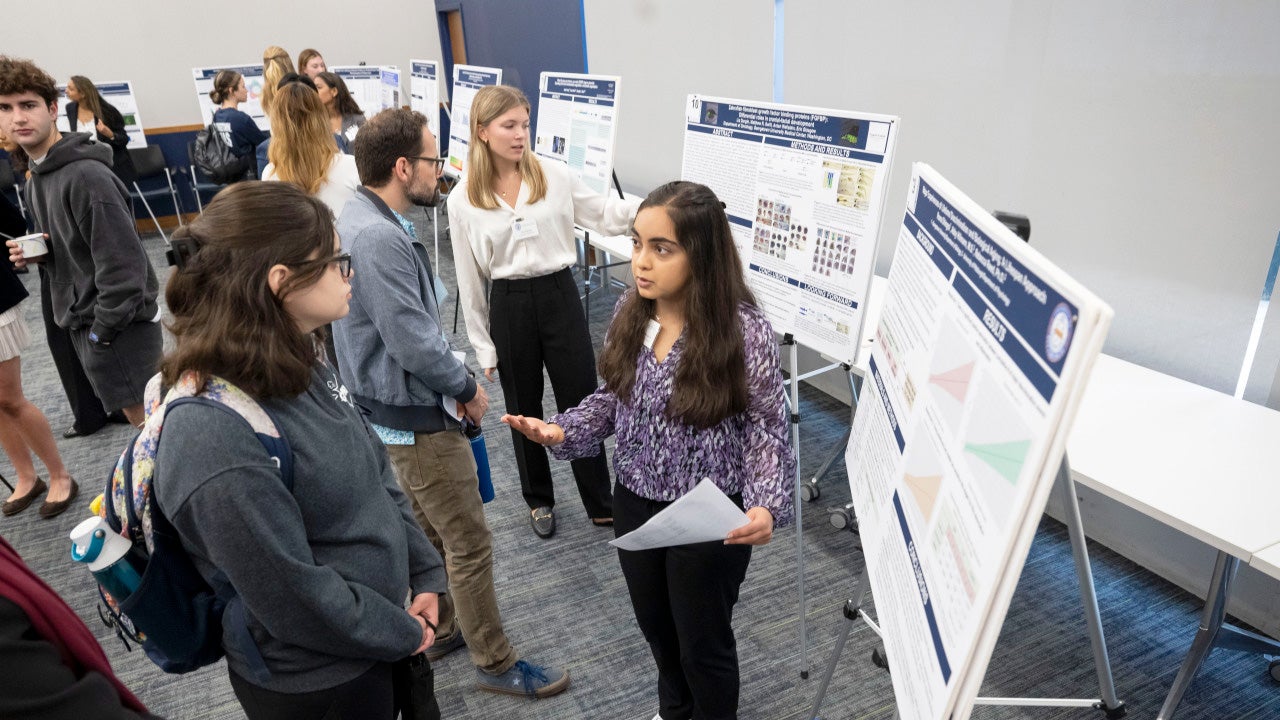Record Number of Students Share Research at Annual Undergraduate Research Conference
(April 20, 2024) — A record 94 Georgetown students from diverse majors such as biology, nursing, chemistry, psychology, and the human sciences presented their work at this year’s Undergraduate Research Conference (URC), which took place during a daylong poster session on Wednesday, April 17, in the Healey Family Student Center.
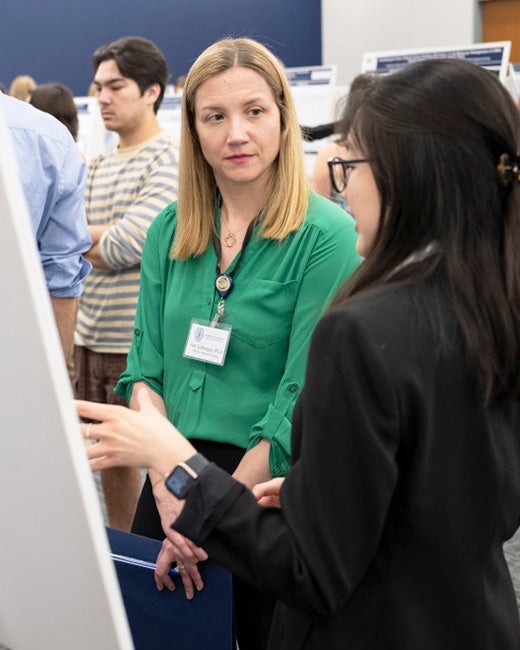
Jan LaRocque, PhD, listens to a student’s research presentation.
“This conference provides a unique opportunity for students to present their science and health-related research to their peers and faculty,” said Jan LaRocque, PhD, associate professor, Department of Human Science at the School of Health and faculty co-advisor for the conference. “Students see the value of the experience, which is reflected in the record-setting number of poster presentations for this year’s event.”
Makenzie Thomas (H’24) recommended underclassmen interested in research attend to see firsthand the variety of research opportunities available on campus. Thomas presented her human science honors thesis research in addition to serving as student co-chair for the conference along with Nick Cohen (H’25). The student co-chairs collect and review submitted abstracts and print all of the research posters for the conference.
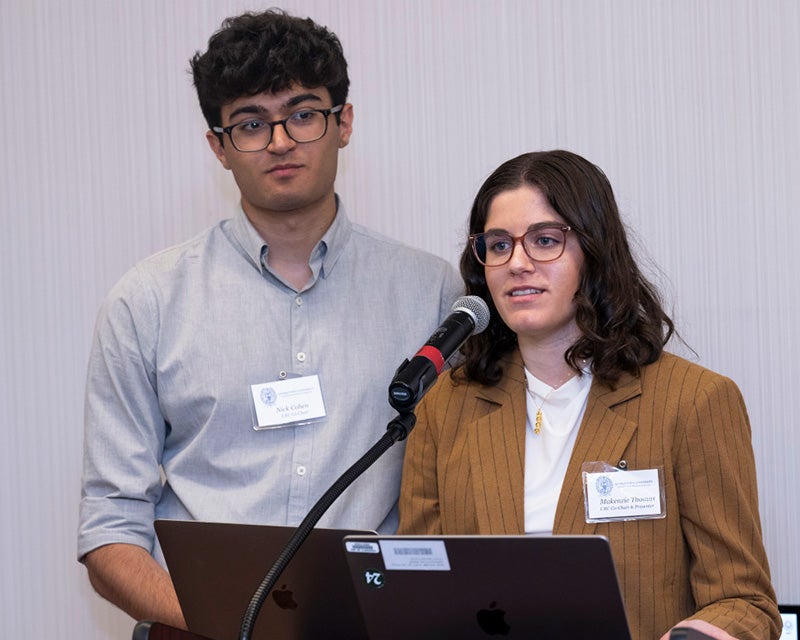
Conference organizers Makenzie Thomas (H’24) and Nick Cohen (H’25)
“Printing the posters takes a lot of work, but doing so fulfills one of our key tenets of making the conference accessible to all students who may not have the ability to pay to have a poster professionally printed,” said Thomas.
The student co-chairs also selected the keynote speaker for the event. This year they chose Sharon Savage, MD, director of the National Cancer Institute’s (NCI) clinical genetics branch and clinical director of NCI’s division of cancer epidemiology and genetics.
Learning Scientific Communication Skills
The interdisciplinarity of the department of human science, which established the conference in 2003 and still takes a leading organizing role, is reflected in the variety of research presented at the annual conference.
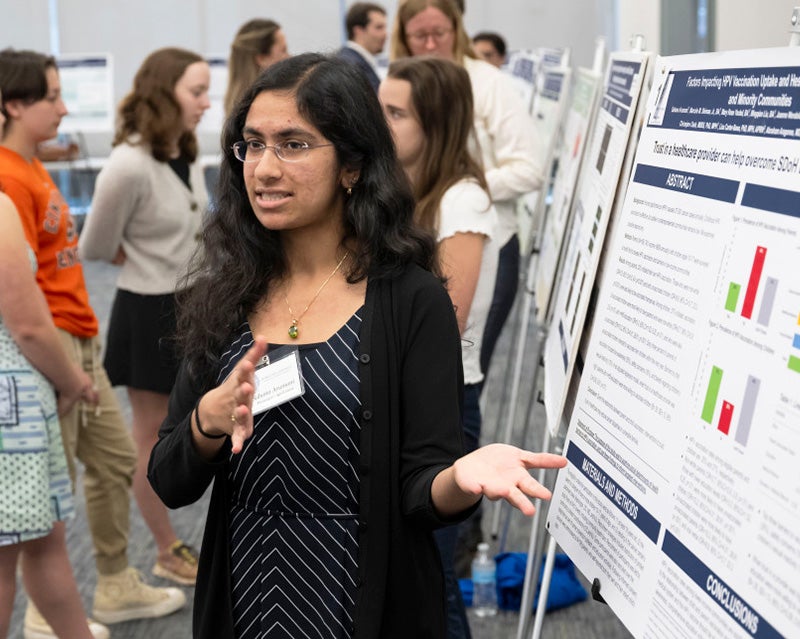
By participating in the Undergraduate Research Conference, students learn about the process of presenting their research.
“Students can get trapped in their niche of their major or lab, and the URC shows the range of research students are doing, from studying a particular protein in a lab, to investigating a more public health-related issue, to even improving the clinical side of care,” said Thomas.
In sharing their research at URC, students learn about the process of presenting their research, from writing a concise abstract to creating a thoughtful poster presentation of their work.
“The URC provided a platform to present projects in a professional manner while surrounded by familiar faces,” recalled Larissa Wietlisbach (NHS ‘18) who is currently in her first year of a plastic and reconstructive surgery residency at the University of Chicago. “The conference was an incredible way to not only share research but also grow scientific communications skills.”
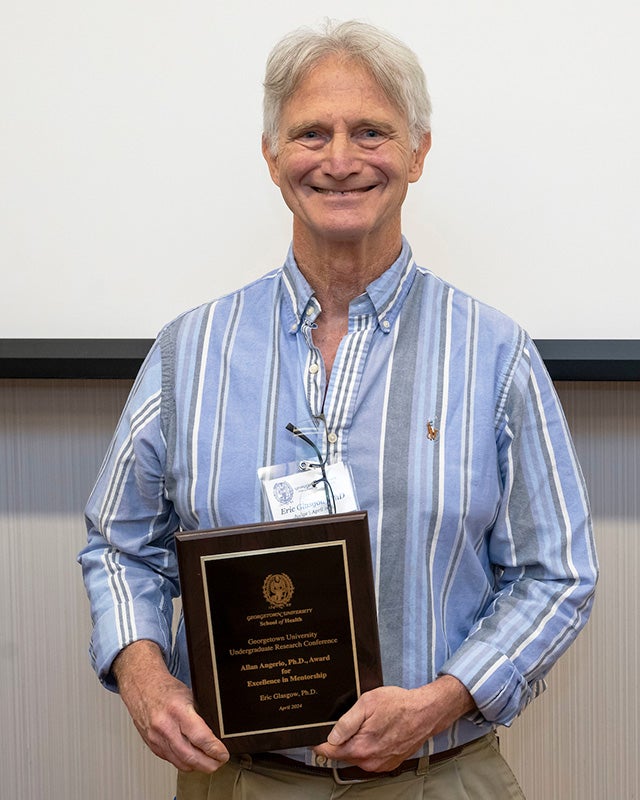
Eric Glasgow, PhD
This year’s Allan Angerio Award for Excellence in Mentorship recipient, Eric Glasgow, PhD, who directs the Zebrafish Shared Resource at Georgetown, encouraged students in his lab to participate in the conference to learn the skills of putting together a coherent scientific story and, for more advanced students, placing their research in the context of larger scientific questions.
“Scientific conferences are the major way that pre-publications science is communicated, so the URC provides a valuable opportunity for students to develop their presentation skills,” Glasgow said. “Sharing the joy of scientific discovery with my students and seeing them develop as scientists has become a favorite part of my job,” he added.
Having Something to Say
Students and faculty who attended the conference had the opportunity to listen to three oral presentations before the awards ceremony that concluded the day’s events.
The student planning committee selected the three presenters for a 15-minute presentation followed by questions and answers with faculty. One of this year’s selectees was Isabel Powell (C’24), who researched undocumented people’s experience with the U.S. health care system after witnessing the difficulties in access for a close family friend.
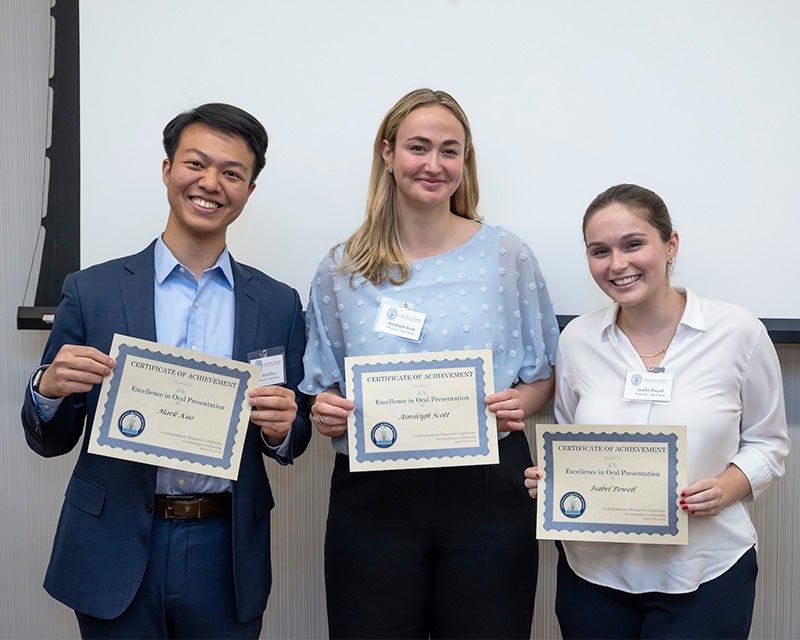
From right: Isabel Powell (C’24), Ainsleigh Scott (C’24) and Mark Kuo (C’24) hold their “Excellence in Oral Presentation” certificates.
Powell chose to explore her research topic both quantitatively in conducting regression analyses using publicly available survey data as well as qualitatively through interviews with organizations that work with undocumented individuals
“The biggest takeaway I’m finding is that solutions to improve access to health care for the undocumented have to be local,” said Powell. “So much depends on local municipalities and states’ engagement to improve access to health care.”
Mark Kuo (C’24) also presented his research on liver cancer and received the award for Best Oral Presentation.
“There’s not a great way to predict liver cancer right now, so my research looks at purified liver cancer cells in the blood to analyze the DNA damage to predict whether cancer will develop again,” said Kuo.
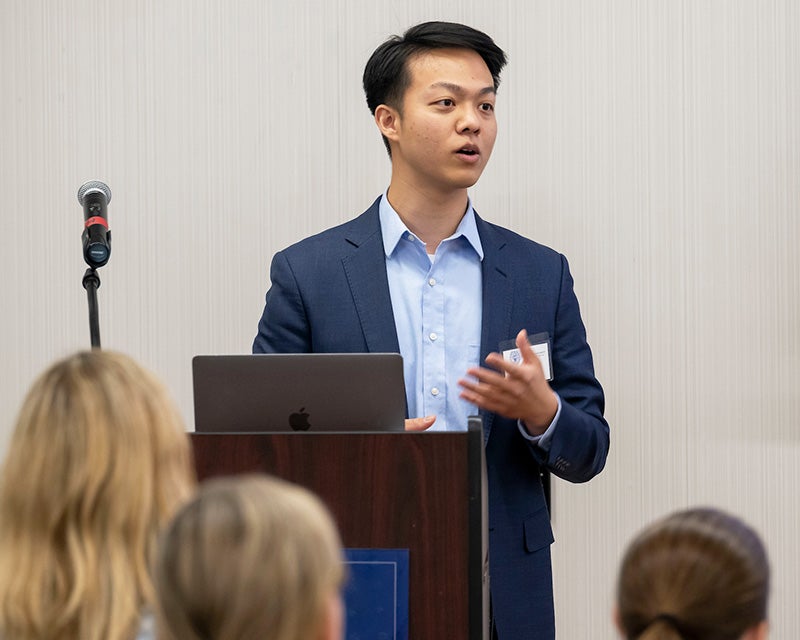
Mark Kuo received “Best Oral Presentation” for the talk he gave about his research.
Though he’s worked on his research since his sophomore year at Georgetown, Kuo waited until his senior year to present the work.
“Seeing all the amazing research that previous cohorts of upperclassmen presented at URC inspired me that one day I would also be ready to present,” said Kuo, who waited until his data pool grew from 10 to 40 patients to present.
Powell attended the conference for the first time this year and encouraged underclassmen to consider getting involved with the event in the future. “I think as students we sometimes have this idea that in order to present research we have to have been working on it for years and it has to be very polished. But I think if you have something meaningful to say, then go ahead and present your work in this great supportive environment.”
Heather Wilpone-Welborn
GUMC Communications
The Undergraduate Research Conference is made possible by the generous support of the Wietlisbach family.
2024 Undergraduate Research Conference Award Winners
Best Poster Presentation
Naomi Greenberg “Modeling an Autosomal Driver that Enables Y- or O-chromosome Meiotic Drive Via Remote Control”
Best Oral Presentation
Mark Kuo “Detection of γ-OHPdG by CTCs and LC-MS/MS as a Hepatocellular Carcinoma Recurrence Biomarker”
Excellence in Oral Presentation
Ainsleigh Scott “Mommy and Me: Analyzing Activity Budgets of Mother Dolphins”
Isabel Powell “Policies Not Police: Preventative Healthcare-Seeking Behaviors Among Undocumented Migrants in the United States”
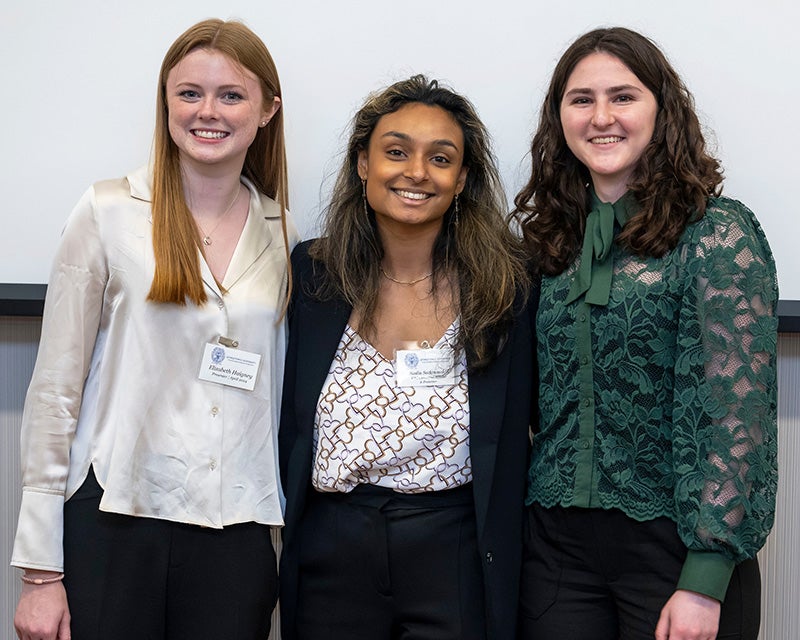
From left: Elizabeth Haigney, Nadia Sandanandan and Victoria Segal
Rising Researcher
Elizabeth Haigney and Maeve Farley “Optimizing Injection Site Selection in Zebrafish Models for Cancer Cell Tracking and Treatment”
Excellence in Poster Presentation
Shannon Chen “Morphofunctional Changes in Microglia with Aging”
Tyller Mensa “Elucidating a Role for Tau in Long-term Depression”
Brianna Miller “Multilevel Barriers and Facilitators of Healthcare Access and Delivery Among Childhood Cancer Survivors”
Nadia Sandanandan “The Role of Tumor Associated Macrophages and Interleukin-6 in Sonic Hedgehog Medulloblastoma (SHH-MB)”
Victoria Segal “Enhancing Enzymatic Flux with Poly-Histidine Coacervate Forming Peptides”
Brady Stallman “Investigating the Role of Insulin-like Peptides in C. elegans’ Sodium Chemotaxis Learning”
Mina Wazni “Neuropeptide Y Mediated Ewing Sarcoma Bone Degradation in TC71 Cells”
Allan Angerio Award for Excellence in Mentorship
Eric Glasgow, PhD

